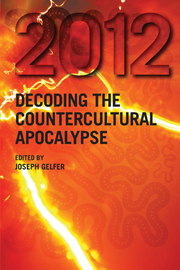Book contents
- Frontmatter
- Contents
- Contributors
- Preface
- 1 Introduction
- 2 The 2012 Phenomenon: New Uses for an Ancient Maya Calendar
- 3 Maya Prophecies, 2012 and the Problematic Nature of Truth
- 4 Mayanism Comes of (New) Age
- 5 The 2012 Milieu? Hybridity, Diversity and Stigmatised Knowledge
- 6 Chichén Itzá and Chicken Little: How Pseudosciences Embraced 2012
- 7 Roland Emmerich's 2012: A Simple Truth
- 8 The 2012 Movement, Visionary Arts and Psytrance Culture
- 9 In a Prophetic Voice: Australasia 2012
- 10 Approaching 2012: Modern Misconceptions versus Reconstructing Ancient Maya Perspectives
- Notes
- Index
9 - In a Prophetic Voice: Australasia 2012
- Frontmatter
- Contents
- Contributors
- Preface
- 1 Introduction
- 2 The 2012 Phenomenon: New Uses for an Ancient Maya Calendar
- 3 Maya Prophecies, 2012 and the Problematic Nature of Truth
- 4 Mayanism Comes of (New) Age
- 5 The 2012 Milieu? Hybridity, Diversity and Stigmatised Knowledge
- 6 Chichén Itzá and Chicken Little: How Pseudosciences Embraced 2012
- 7 Roland Emmerich's 2012: A Simple Truth
- 8 The 2012 Movement, Visionary Arts and Psytrance Culture
- 9 In a Prophetic Voice: Australasia 2012
- 10 Approaching 2012: Modern Misconceptions versus Reconstructing Ancient Maya Perspectives
- Notes
- Index
Summary
As the 2012 phenomenon is ostensibly based on the Maya calendar— from the region geographically located in what we now recognise as southern Mexico and the northern swath of Central America—and as the majority of people interested in 2012 have historically been from the United States, it is easy to assume that 2012 is an American phenomenon. In many ways this is certainly the case, but 2012 manifests in many parts of the world. This article provides a comparative analysis of the 2012 phenomenon from an Australasian point of view (namely, Australia and New Zealand).
Following Robert Sitler's (2006) initial viewing of the 2012 phenomenon as a “new age appropriation of an ancient Mayan calendar,” the way 2012 manifests in Australasia is viewed via the lens of spiritual and cultural appropriation. The following section provides a brief overview of the way in which cultural appropriation functions in Australasia: both in broad terms and with more specific reference to New Age discourse, in which 2012 can loosely be located. The second section looks specifically at the way Australasia is imagined within the 2012 phenomenon: it begins with a few examples of how Australasia is presented in non-Australasian 2012 texts, before moving on to Australasian texts (both those which speak in general terms about 2012 from Australasia, and those which speak about 2012 with specific reference to Australasia).
- Type
- Chapter
- Information
- 2012Decoding the Countercultural Apocalypse, pp. 144 - 162Publisher: Acumen PublishingPrint publication year: 2012



